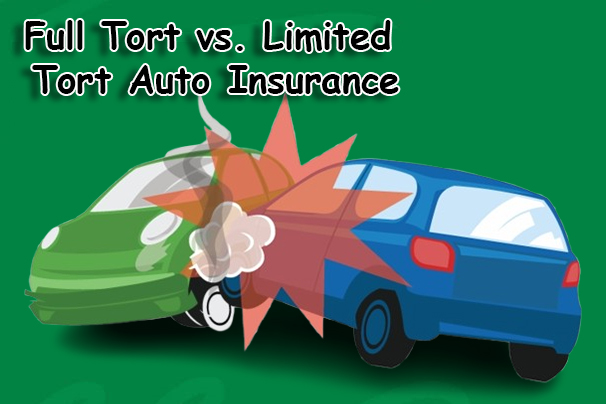Full Tort vs. Limited Tort Auto Insurance It may be quite stressful and upsetting to be caught up in a car accident, especially when you’re attempting to figure out who is financially at fault. Tort insurance is a policy that holds the at-fault motorist financially responsible for any damages, ensuring they are accountable. It provides drivers with the freedom to pursue legal action in cases and offers two major types known as full tort vs. limited tort auto insurance.

You may be the option to choose between full tort vs. limited tort auto insurance in some states by your agent. Although these torts are different, most policyholders confuse them for one another. You must understand what no-fault auto insurance is and the differences between full vs. limited tort.
What is Tort Auto Insurance?
Tort insurance is the most widely used auto insurance program in the US, utilized in 38 states. Under the tort system, the driver who caused the accident is liable for the other party’s losses and medical expenses, usually through liability insurance.
These damages may consist of:
- Car damage
- Medical care bills
- Lost wages
- Suffering and pain
- Possible future expenses
In the tort system, which is the opposite of the no-fault system, drivers must have PIP insurance with liability coverage. This is to cover their own medical expenses with those of their passengers. No-fault systems prohibit drivers from filing lawsuits for compensation for pain and suffering, with rare exceptions.
What’s the Difference Between Full Tort vs. Limited Tort Auto Insurance?
In some states, auto insurance policies come in two varieties: full tort and limited tort coverage. After an automobile accident, full tort permits people to seek any kind of compensation to which they may be entitled, including pain and suffering compensation. Unless the injuries satisfy specific legal requirements, limited tort coverage limits a person’s ability to pursue damages for pain and suffering.
Full Tort Auto Insurance
People have the right to sue an at-fault driver in 38 states that have a tort insurance system for pain and suffering, medical costs, lost wages, and auto repairs. This plan, sometimes referred to as full tort insurance, might not completely compensate for accident-related damages. People may have to pay out of cash or seek compensation under their own policy if the at-fault party’s insurance does not completely cover losses. Insurance companies can subrogate against other drivers’ insurance companies to recover losses if an underinsured motorist or collision claim is successful.
Limited Tort Auto Insurance
Limited tort auto insurance allows victims of careless drivers to sue them for a limited sum but does not cover pain and suffering. To use limited tort coverage, you must have monetary damages from the accident, like medical bills and other out-of-pocket costs. Limited tort insurance is more affordable than full tort insurance, but it is not as comprehensive. Also, you will need to present documentation of your accident-related medical bills or other expenses when you submit a claim under your limited tort policy.
Is Full Tort the Same as Full Coverage?
No, full coverage and full tort are not synonymous. After an accident, you have the unfettered right to claim for damages, no matter how severe, if you have full tort auto insurance. The phrase “full coverage” usually refers to a grouping of insurance policies that contain comprehensive, collision, and liability coverage. Furthermore, full coverage is an insurance policy that provides protection for your car, while full tort refers to legal rights in accident claims.
Full Tort vs. Limited Tort Auto Insurance: Which Is Better?
Before choosing between limited tort vs. full tort auto insurance, it’s crucial to review your state’s laws, as most have at-fault laws that impose financial liability on the at-fault motorist. However, the coverage you select will rely on your financial circumstances and risk tolerance if you reside in Kentucky, New Jersey, or Pennsylvania.
A full tort insurance policy, despite being more expensive, provides extensive financial compensation in case of a major accident. Meanwhile, a limited tort insurance policy is less expensive but does not allow you to sue for non-monetary damages resulting from an accident. Your financial situation and preferences regarding your ability to file a lawsuit in the worst-case situation will determine which option is best for you.



